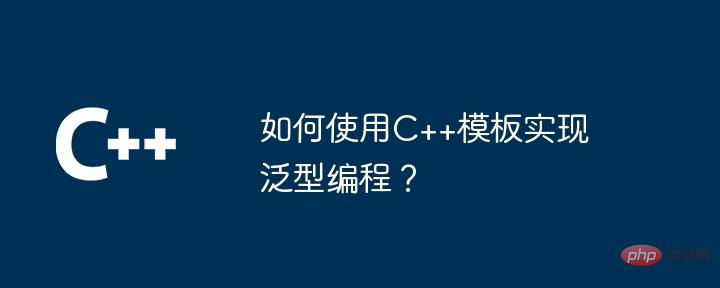
Through the use of templates, generic programming in C allows writing code that can handle different types of data without having to write separate code for each type. Template code is defined as generic through the use of template parameters and can be instantiated at compile time into a specific type, implementing a function, class, or typed generic code.

How to use C templates to implement generic programming
Introduction
Generics Programming is a software development technique that allows you to write code that can handle different types of data without having to write separate code for each type. In C, this can be achieved by using templates.
Templates
Templates are code patterns that allow you to define functions, classes, or other types of code that are typed as generic (or generic). This means that template code can be instantiated into different types at compile time.
Create a template
To create a template, you need to use the template keyword, followed by the template parameter list:
template <typename T>
In this example, T is the template parameter, which will be replaced with the actual type at compile time.
Instancing Templates
To use a template, you need to instantiate it. This means creating a concrete version of the template function or class where the template parameters are replaced with actual types.
std::vector<int> myVector;
In this example, std::vector is a template class that represents a vector. We instantiate the vector by instantiating the template parameter T to int.
Practical Case: Sorting Algorithm
Suppose you want to write an algorithm that can sort any data type. You can achieve this by using a template:
template <typename T> void Sort(std::vector& vec) { // 对 vec 进行排序的代码 }
The Sort function can sort the elements of any vector of type T. You can use it to sort types such as integers, doubles, or strings.
Conclusion
By using templates, you can easily write generic code that works on different types of data. This improves code reusability and flexibility.
The above is the detailed content of How to implement generic programming using C++ templates?. For more information, please follow other related articles on the PHP Chinese website!
 What are the differences between c++ and c language
What are the differences between c++ and c language
 Recommended learning order for c++ and python
Recommended learning order for c++ and python
 Cost-effectiveness analysis of learning python and c++
Cost-effectiveness analysis of learning python and c++
 Is c language the same as c++?
Is c language the same as c++?
 Which is better to learn first, c language or c++?
Which is better to learn first, c language or c++?
 The difference and connection between c language and c++
The difference and connection between c language and c++
 C++ software Chinese change tutorial
C++ software Chinese change tutorial
 Cost-effectiveness analysis of learning python, java and c++
Cost-effectiveness analysis of learning python, java and c++




